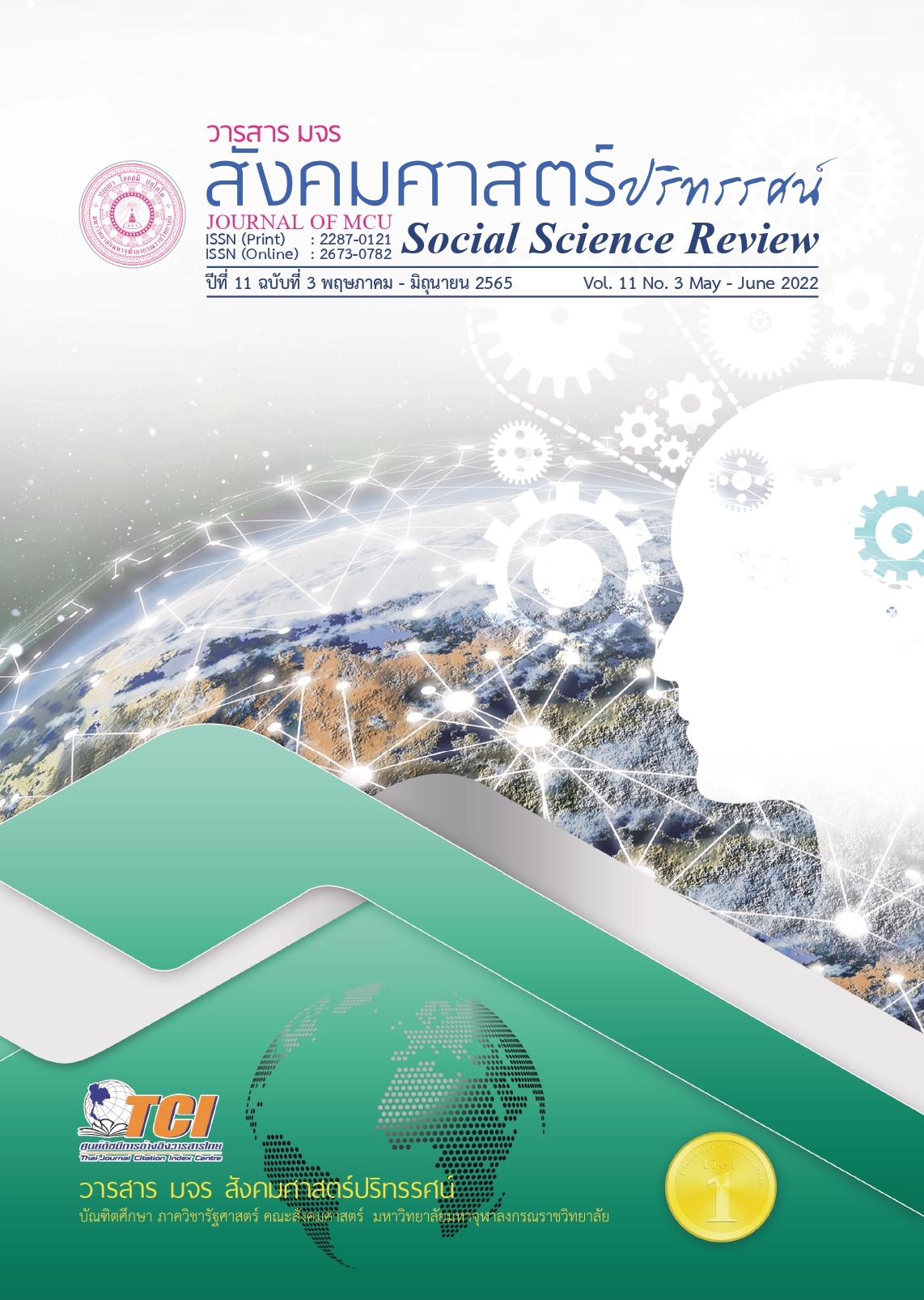การบริหารจัดการของรัฐในการส่งเสริมกัญชาเสรี เพื่อการแพทย์ทางเลือกของไทย
คำสำคัญ:
การบริหารจัดการภาครัฐ, การส่งเสริมกัญชาเสรี, แพทย์ทางเลือกบทคัดย่อ
บทความวิจัยนี้มีวัตถุประสงค์เพื่อ ศึกษาสภาพการบริหารจัดการ ศึกษาองค์ประกอบ และนำเสนอรูปแบบการบริหารจัดการ เป็นการวิจัยเชิงคุณภาพ หลังจากนั้นนำข้อมูลที่ได้จากการสังเคราะห์นำมาสนทนากลุ่มเฉพาะ 40 คน เก็บข้อมูลโดยการสัมภาษณ์เชิงลึก 25 คน วิเคราะห์ข้อมูลเชิงคุณภาพใช้การวิเคราะห์เนื้อหาและข้อสรุปแบบอุปนัย
ผลการวิจัยพบว่า 1) สภาพการบริหารจัดการของรัฐในการส่งเสริมกัญชาเสรีเพื่อการแพทย์ทางเลือกของไทย ได้นำแนวนโยบายการบริหารจัดการส่งเสริมกัญชาเสรีเพื่อการแพทย์ทางเลือกของไทยเป็นนโยบายสาธารณะด้านสุขภาพ มีแนวทางในการปฏิบัติงานของรัฐบาลหรือโครงการที่รัฐบาลกำหนดขึ้นและมีผลกระทบต่อระบบสุขภาพของประชาชนในสังคม โดยมีเป้าหมายเพื่อสร้างเสริมสิ่งแวดล้อมทั้งทางสังคมและทางกายภาพให้เอื้อต่อการมีสุขภาพและคุณภาพชีวิตที่ดี และมุ่งให้ประชาชนมีทางเลือกและสามารถเข้าถึงทางเลือกที่ก่อให้เกิดสุขภาพดีได้ 2) องค์ประกอบที่มีผลต่อระบบบริหารจัดการของรัฐในการส่งเสริมกัญชาเสรีเพื่อการแพทย์ทางเลือกของไทยประกอบด้วย 8 ด้าน ดังนี้ การวางแผน การบริหารงานบุคคล การฝึกอบรม การนิเทศติดตาม การจัดสิ่งสนับสนุนการจัดการงบประมาณ การจัดการข้อมูลข่าวสาร และการจัดองค์กรชุมชน3) นำเสนอรูปแบบการบริหารจัดการของรัฐโดยใช้หลักธรรม สังคหวัตถุ 4 เพื่อการบริหารจัดการที่ดีที่จะพาไปสู่เป้าหมายขององค์กร รวมไปถึงวิสัยทัศน์ คุณสมบัติของผู้บริหารที่ดีประกอบด้วย ทาน (โอบอ้อมอารี ช่วยเหลือ) ปิยวาจา (พูดไพเราะ) อัตถจริยา (สงเคราะห์ประชาชน) และ สมานัตตตา (เสมอต้นเสมอปลาย)
เอกสารอ้างอิง
กรมการแพทย์. (2564). แนวทางการจัดบริการคลินิกกัญชาทางการแพทย์แบบบูรณาการ.กรุงเทพฯ: กระทรวงสาธารณสุข.
วีรยา ถาอุปชิต. (2564). นโยบายกัญชา: การวิเคราะห์เปรียบเทียบ ไทย สหรัฐอเมริกา แคนาดา เยอรมัน และอิสราเอล. วารสารเภสัชกรรมไทย, 13(1), 4-16.
ชำนาญ ช้างสาต. (2559). แนวคิดในการนำนโยบาย สู่การปฏิบัติโดยสำนักบริหารนโยบาย. กรุงเทพฯ: วิทยาลัยป้องกันราชอาณาจักร สถาบันวิชาการป้องกันประเทศ.
ดวงหทัยชนก เรืองหนองยาง. (2561). การประยุกต์ใช้แนวทางการบริหารจัดการภาครัฐแนวใหม่ในการจัดการระบบสาธารณสุขของประเทศไทย, วารสารศิลปการจัดการ, 2(3), 167-178
ปัตพงษ์ เกษสมบูรณ์. (2561). กัญชาทางการแพทย์. วารสารยาวิพากษ์: จดหมายข่าวศูนย์ข้อมูลเฝ้าระวังระบบยา, 9(36), 13-5.
พระครูศรีปริยัตยารักษ์. (2562). การนำหลักสังคหวัตถุ 4 ไปใช้ในพัฒนาการบริหารจัดการขององค์กรบริหารสว่นตำบล. วารสารธรรมวิชญ์, 2(2).
มานพ คณะโต. (2559). นโยบายและการจัดการปัญหากัญชา: กรณีศึกษาประเทศอังกฤษและประเทศสหรัฐอเมริกา. กรุงเทพฯ: บริษัท จรัลสนิทวงศ์การพิมพ์จำกัด.
ศูนย์วิจัยกสิกรไทย,“กัญชา” จะกลายเป็นพืชเศรษฐกิจไทย ได้หรือไม่?, สืบค้น 15 พฤศจิกายน 2563, จาก https://kasikornresearch.com/th/analysis/k-social-media/Pages/FB-Cannabis-14-01-20.aspx,
อรทัย ก๊กผล. (2559). การบริหารจัดการและการจัดทำแผนการมีส่วนร่วมของประชาชน.กรุงเทพฯ: สถาบันพระปกเกล้า.
อิงฟ้า สิงห์น้อย. (2561). นโยบายสาธารณะ: การบริหารและการจัดการภาครัฐ”. วารสารสันติศึกษาปริทรรศน์ มจร, 6(ฉบับพิเศษ).
ดาวน์โหลด
เผยแพร่แล้ว
รูปแบบการอ้างอิง
ฉบับ
ประเภทบทความ
สัญญาอนุญาต
ลิขสิทธิ์ (c) 2022 วารสาร มจร สังคมศาสตร์ปริทรรศน์

อนุญาตภายใต้เงื่อนไข Creative Commons Attribution-NonCommercial-NoDerivatives 4.0 International License.
เพื่อให้เป็นไปตามกฎหมายลิขสิทธิ์ ผู้นิพนธ์ทุกท่านต้องลงลายมือชื่อในแบบฟอร์มใบมอบลิขสิทธิ์บทความให้แก่วารสารฯ พร้อมกับบทความต้นฉบับที่ได้แก้ไขครั้งสุดท้าย นอกจากนี้ ผู้นิพนธ์ทุกท่านต้องยืนยันว่าบทความต้นฉบับที่ส่งมาตีพิมพ์นั้น ได้ส่งมาตีพิมพ์เฉพาะในวารสาร มจร สังคมศาสตร์ปริทรรศน์ เพียงแห่งเดียวเท่านั้น หากมีการใช้ภาพหรือตารางหรือเนื้อหาอื่นๆ ของผู้นิพนธ์อื่นที่ปรากฏในสิ่งตีพิมพ์อื่นมาแล้ว ผู้นิพนธ์ต้องขออนุญาตเจ้าของลิขสิทธิ์ก่อน พร้อมทั้งแสดงหนังสือที่ได้รับการยินยอมต่อบรรณาธิการ ก่อนที่บทความจะได้รับการตีพิมพ์ หากไม่เป็นไปตามข้อกำหนดเบื้องต้น ทางวารสารจะถอดบทความของท่านออกโดยไม่มีข้อยกเว้นใดๆ ทั้งสิ้น





